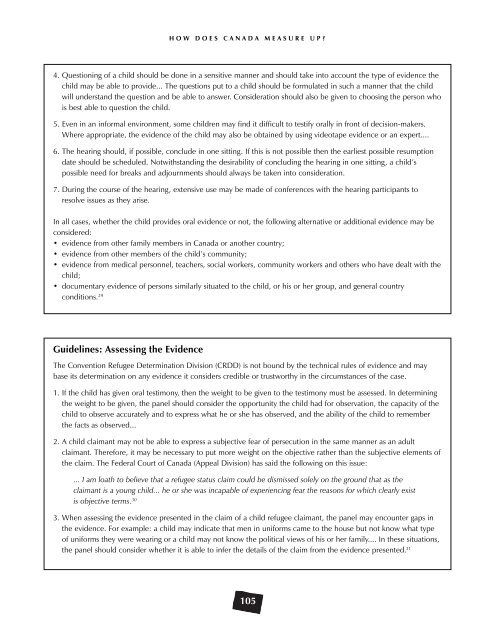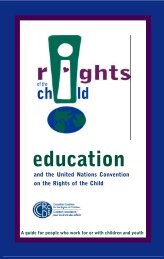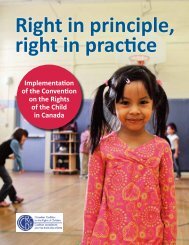Poste - Canadian Coalition for the Rights of Children
Poste - Canadian Coalition for the Rights of Children
Poste - Canadian Coalition for the Rights of Children
Create successful ePaper yourself
Turn your PDF publications into a flip-book with our unique Google optimized e-Paper software.
H O W D O E S C A N A D A M E A S U R E U P ?<br />
4. Questioning <strong>of</strong> a child should be done in a sensitive manner and should take into account <strong>the</strong> type <strong>of</strong> evidence <strong>the</strong><br />
child may be able to provide... The questions put to a child should be <strong>for</strong>mulated in such a manner that <strong>the</strong> child<br />
will understand <strong>the</strong> question and be able to answer. Consideration should also be given to choosing <strong>the</strong> person who<br />
is best able to question <strong>the</strong> child.<br />
5. Even in an in<strong>for</strong>mal environment, some children may find it difficult to testify orally in front <strong>of</strong> decision-makers.<br />
Where appropriate, <strong>the</strong> evidence <strong>of</strong> <strong>the</strong> child may also be obtained by using videotape evidence or an expert....<br />
6. The hearing should, if possible, conclude in one sitting. If this is not possible <strong>the</strong>n <strong>the</strong> earliest possible resumption<br />
date should be scheduled. Notwithstanding <strong>the</strong> desirability <strong>of</strong> concluding <strong>the</strong> hearing in one sitting, a child’s<br />
possible need <strong>for</strong> breaks and adjournments should always be taken into consideration.<br />
7. During <strong>the</strong> course <strong>of</strong> <strong>the</strong> hearing, extensive use may be made <strong>of</strong> conferences with <strong>the</strong> hearing participants to<br />
resolve issues as <strong>the</strong>y arise.<br />
In all cases, whe<strong>the</strong>r <strong>the</strong> child provides oral evidence or not, <strong>the</strong> following alternative or additional evidence may be<br />
considered:<br />
• evidence from o<strong>the</strong>r family members in Canada or ano<strong>the</strong>r country;<br />
• evidence from o<strong>the</strong>r members <strong>of</strong> <strong>the</strong> child’s community;<br />
• evidence from medical personnel, teachers, social workers, community workers and o<strong>the</strong>rs who have dealt with <strong>the</strong><br />
child;<br />
• documentary evidence <strong>of</strong> persons similarly situated to <strong>the</strong> child, or his or her group, and general country<br />
conditions. 29<br />
Guidelines: Assessing <strong>the</strong> Evidence<br />
The Convention Refugee Determination Division (CRDD) is not bound by <strong>the</strong> technical rules <strong>of</strong> evidence and may<br />
base its determination on any evidence it considers credible or trustworthy in <strong>the</strong> circumstances <strong>of</strong> <strong>the</strong> case.<br />
1. If <strong>the</strong> child has given oral testimony, <strong>the</strong>n <strong>the</strong> weight to be given to <strong>the</strong> testimony must be assessed. In determining<br />
<strong>the</strong> weight to be given, <strong>the</strong> panel should consider <strong>the</strong> opportunity <strong>the</strong> child had <strong>for</strong> observation, <strong>the</strong> capacity <strong>of</strong> <strong>the</strong><br />
child to observe accurately and to express what he or she has observed, and <strong>the</strong> ability <strong>of</strong> <strong>the</strong> child to remember<br />
<strong>the</strong> facts as observed...<br />
2. A child claimant may not be able to express a subjective fear <strong>of</strong> persecution in <strong>the</strong> same manner as an adult<br />
claimant. There<strong>for</strong>e, it may be necessary to put more weight on <strong>the</strong> objective ra<strong>the</strong>r than <strong>the</strong> subjective elements <strong>of</strong><br />
<strong>the</strong> claim. The Federal Court <strong>of</strong> Canada (Appeal Division) has said <strong>the</strong> following on this issue:<br />
... I am loath to believe that a refugee status claim could be dismissed solely on <strong>the</strong> ground that as <strong>the</strong><br />
claimant is a young child... he or she was incapable <strong>of</strong> experiencing fear <strong>the</strong> reasons <strong>for</strong> which clearly exist<br />
is objective terms. 30<br />
3. When assessing <strong>the</strong> evidence presented in <strong>the</strong> claim <strong>of</strong> a child refugee claimant, <strong>the</strong> panel may encounter gaps in<br />
<strong>the</strong> evidence. For example: a child may indicate that men in uni<strong>for</strong>ms came to <strong>the</strong> house but not know what type<br />
<strong>of</strong> uni<strong>for</strong>ms <strong>the</strong>y were wearing or a child may not know <strong>the</strong> political views <strong>of</strong> his or her family.... In <strong>the</strong>se situations,<br />
<strong>the</strong> panel should consider whe<strong>the</strong>r it is able to infer <strong>the</strong> details <strong>of</strong> <strong>the</strong> claim from <strong>the</strong> evidence presented. 31<br />
105




